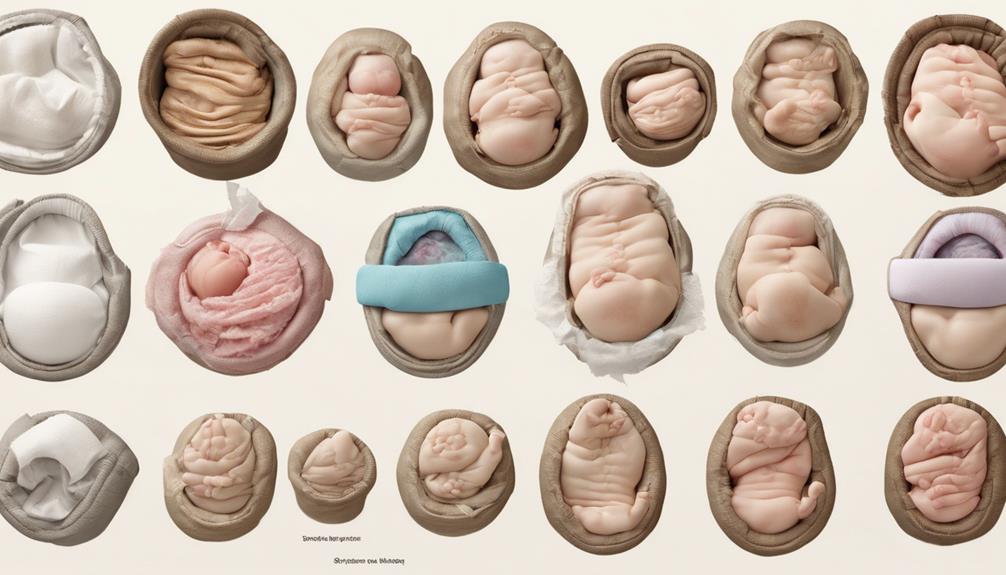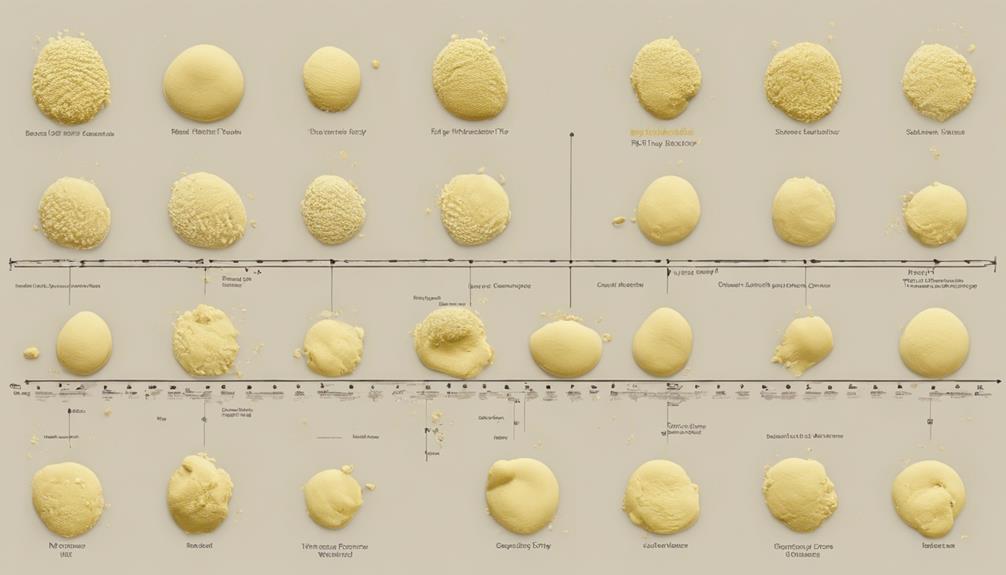As parents, we've all been there – changing diaper after diaper, wondering how something so little can produce so much.
But have you ever stopped to think about why your newborn poops so frequently?
The answer lies in understanding the intricacies of their digestive system and what constitutes normal bowel movements in those early days of life.
Let's explore the fascinating world of newborn poop and uncover the secrets behind their seemingly endless stream of diaper surprises.
Key Takeaways
- Newborns poop frequently due to their immature digestive systems and high fluid content in breast milk.
- Breastfed babies may have more bowel movements, while formula-fed babies might have slightly fewer.
- Changes in stool color like red, white, or black should be monitored for potential health concerns.
- Healthy newborn poop is soft, seedy, and yellow; consult a pediatrician for abnormal stool colors or textures.
Normal Frequency of Newborn Poop
Newborns generally have one or more bowel movements daily. It's entirely normal for your baby to fill up those diapers frequently. The very first stool your newborn passes is called meconium. This sticky, tar-like substance is made up of materials ingested while in the womb and is usually passed within the initial 24 hours after birth. For breast-fed babies, it's common to see even more dirty diapers as breast milk is easily digested, leading to a bowel movement every feed or even more. However, formula-fed babies might've slightly fewer bowel movements.
Monitoring your baby's poop is important for their health. It's a good idea to pay attention to any changes in color, like black, red, or white stools, as these could indicate underlying issues that need to be addressed promptly. Remember, if your baby goes more than a week without a bowel movement, it's time to reach out to your pediatrician for guidance and support.
Factors Influencing Newborn Bowel Movements

When considering the factors influencing bowel movements in newborns, the high fluid content in breast milk plays a significant role in the frequency of stool production.
- Breastfed newborns tend to have more frequent bowel movements due to the easily digestible nature of breast milk.
- Newborns have immature digestive systems that process food quickly, leading to more frequent bowel movements.
- The high fluid content in breast milk can contribute to increased stool production in breastfed babies.
- Newborns lack the ability to control their bowel movements, resulting in frequent and sometimes unpredictable pooping.
- Factors like feeding frequency, hydration levels, and gut bacteria colonization can influence a newborn's poop frequency.
These factors collectively contribute to the normal bowel movements observed in newborns, characterized by frequent and loose stools. Understanding these influences can help parents navigate the unpredictable nature of newborn poop and ensure the baby's health and comfort.
Types of Newborn Poop
The characteristics of newborn poop can range from tarry black meconium in the initial days to a yellow, seedy, rice pudding-like consistency. Breastfed babies often have more frequent and watery stools, while formula-fed babies tend to have less frequent and firmer stools. As infants shift to solid foods, changes in poop color, consistency, and frequency can occur. It is important to pay attention to any red, white, or black stools as they may indicate underlying health issues that require prompt medical attention. Monitoring newborn poop helps in evaluating their overall health and well-being.
| Aspect | Description |
|---|---|
| Poop Color | Can vary from black to yellow |
| Poop Consistency | Ranges from watery to firm |
| Poop Frequency | Breastfed babies poop more frequently |
| Red Stools | Indicates potential health concerns |
| White Stools | May signal an issue requiring attention |
Understanding the different types of newborn poop can provide valuable insights into the baby's health and help caregivers respond appropriately to any changes.
Signs of Healthy Bowel Movements
What're the key indicators of a healthy newborn's bowel movements, and how can caregivers recognize them? Newborn bowel movements can hold essential clues about their health. Here are signs to look out for:
- Frequency: Healthy newborns can poop multiple times a day or every few days.
- Consistency: Normal stool is soft, seedy, and resembles rice pudding.
- Color: Stool shifts from dark meconium to yellow, seedy stool within the first days. Colors can range from yellow to green to brown.
- Texture: A healthy newborn's stool should have a soft and malleable texture.
- Pediatrician Consult: Contact your pediatrician if you notice bright red, pale white, or black stools as these could indicate issues.
When to Seek Medical Advice
Paying close attention to changes in your newborn's bowel movements can provide valuable insights into their health, especially when it comes to knowing when to seek medical advice. If you notice red flags such as consistently red, white, or black colored poop, it's essential to consult a pediatrician. Additionally, if your newborn's poop appears hard, small, and ball-like, it could be a sign of constipation, warranting a doctor's evaluation. Any changes in bowel patterns or signs of discomfort in newborns under 2 months old should prompt a call to the pediatrician for further assessment. Likewise, if your baby shows distress or unusual bowel movements, seeking medical advice is vital. For instances of constipation with small, hard stools, professional evaluation and management by a pediatrician are necessary to guarantee your newborn's poop-related issues are addressed promptly.
| Warning Signs | Action Needed |
|---|---|
| Red, white, or black poop | Consult a pediatrician |
| Hard, small, ball-like stools | Seek medical advice |
| Changes in bowel patterns or discomfort | Contact a pediatrician |
| Distress or unusual bowel movements | Prompt evaluation |
| Small, hard stools | Professional management |
Frequently Asked Questions
Is It Normal for a Newborn to Poop Constantly?
Yes, it is normal for a newborn to poop frequently. Breastfed babies might have more bowel movements than formula-fed infants. Passing meconium within the first 24 hours is common. We should monitor color changes for any health concerns.
How Many Poops Is Too Many for a Newborn?
I recognize your concern about newborn pooping frequency. Typically, newborns can poop up to 8 times a day. If your baby poops less than once a day after the first week, consulting a pediatrician is advisable for reassurance.
What Is Unhealthy Poop for Newborns?
When it comes to newborns, unhealthy poop may show as grey, white, red, or black colors. Concern arises with abnormal stool frequency like days without pooping. Seek medical advice for persistent watery or hard stools.
What Are Normal Bowel Habits for Newborns?
We notice newborns often have frequent bowel movements, ranging from daily to every few days. Breastfed babies might go every four to five days. Meconium, the initial black stool, changes to a yellow, seedy texture within days.
Conclusion
To sum up, understanding your newborn's bowel movements can provide valuable insight into their health and well-being. By paying attention to the frequency, texture, and color of their poop, you can guarantee they're thriving and developing as expected.
Remember, knowledge is power, so don't hesitate to reach out to your pediatrician if you have any concerns. After all, it's better to be safe than sorry when it comes to your little one's health.









